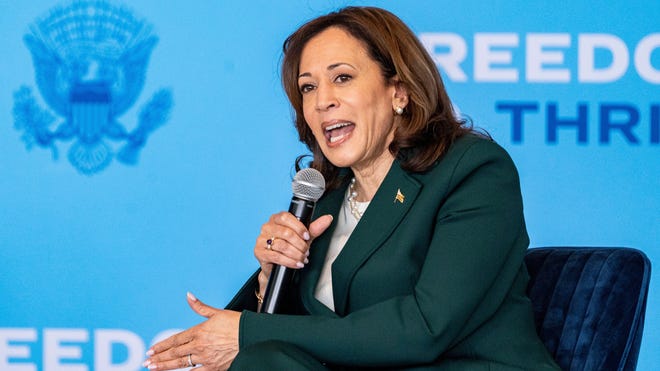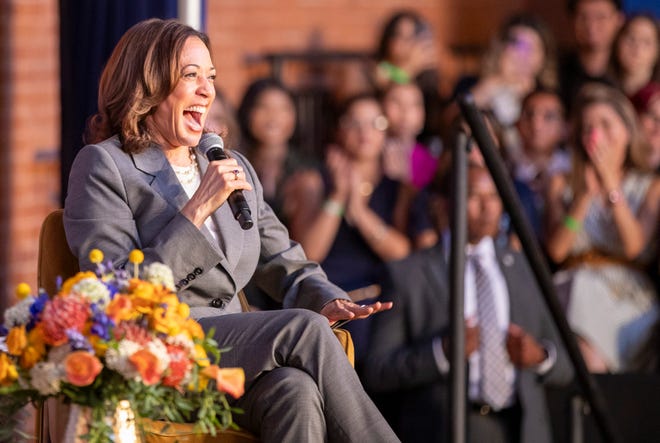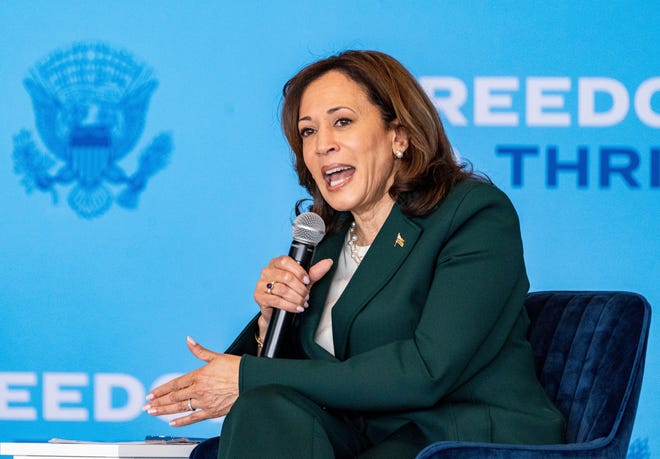
[Editor’s note: An earlier version of this story misstated Harris’ proposed 2019 climate plan investment levels. The correct estimate is nearly seven times more than Biden’s current proposal.]
Vice President Kamala Harris has emerged as the Democratic party’s presidential frontrunner after Joe Biden dropped his reelection bid Sunday.
Most Democrats have backed Harris, who announced her 2024 campaign for president shortly after Biden penned a letter explaining his decision to exit the 2024 race. Depending on who you ask, Harris is viewed as a moderate or a progressive reformer.
A former prosecutor, Harris was elected San Francisco’s district attorney with a “tough on crime” message in 2003 and worked in that role for seven years. She became the state’s attorney general in 2011 and served until 2017, when she was elected to represent California in the U.S. Senate.
Text with USA TODAY:Sign-up now and get answers to all your election questions.

More:Election 2024 live updates: Endorsements rush in for Harris; Trump attacks begin
Harris launched her own unsuccessful presidential campaign at a rally in her hometown of Oakland, California in 2019. She dropped her bid for the White House and joined President Joe Biden’s ticket in August the following year. In 2021, she was sworn in as vice president.
Decades in the public spotlight and on the public record, here is what we know about where Harris stands on key issues:
Foreign Policy
As Biden’s second-in-command, Harris has largely stood behind his foreign policy positions, but there are signs she could be tougher on Israel over the war in Gaza than the president.
Harris has not given reason to believe she will deviate much from Biden on issues relating to China, for example. She is also unlikely to sway from supporting Ukraine. Harris said earlier this year that Russia has committed “crimes against humanity” in Ukraine over the last two years.
Harris has not directly opposed Biden’s staunch support for Israel, but has expressed sympathy for the more than 38,000 Palestinian lives lost during the conflict. She was one of the first high-profile members of his administration to call for an immediate temporary cease-fire in March. She acknowledged the “immense scale of suffering” in Gaza and said the Israel-Hamas war is a “humanitarian catastrophe” for innocent civilians.
Abortion
Harris’ support for women’s access to abortions has been a focal point of her tenure as the country’s first female vice president. She embarked on a nationwide Reproductive Freedoms Tour earlier this year to draw attention to attacks on abortion access following the Dobbs decision. She attended her first stop in Wisconsin on Jan. 22, the 51st anniversary of Roe v. Wade.
Harris proposed federal protections that would limit state abortion restrictions during her first presidential campaign. Under her proposal, states would need to clear laws regulating abortion with the Department of Justice, which would need to confirm they are constitutional before taking effect, she explained in 2019.
“How dare these elected leaders believe they are in a better position to tell women what they need, to tell women what is in their best interest?” Harris asked during a visit to a Minnesota Planned Parenthood clinic in March. “We have to be a nation that trusts women.”
Economy
Harris has traveled on an Economic Opportunity Tour this summer to defend the Biden administration’s economic policy and attack former President Donald Trump’s economic agenda.
While on tour, she touted legislation passed during Biden’s time in office, including the American Rescue Plan and Inflation Reduction Act. Harris has tried to emphasize that wage increases have outpaced inflation since the pandemic and made the case that Trump has plans to give more tax cuts to the rich.
“Donald Trump gave tax cuts to billionaires,” she said in a June social media post. “President Joe Biden and I are investing in the middle class and making sure billionaires and big corporations pay their fair share.”

Climate
The vice president has made clear that climate change is a key issue a Harris administration would seek to address.
While running for president in 2019, she proposed a climate plan with a $10 trillion price tag — nearly seven times more than the $1.6 trillion Biden has invested in addressing the issue. She also called for a ban on fracking.
As a senator, she co-sponsored the Green New Deal, which called for a dramatic increase in the production of renewable fuels, including wind, solar, and hydropower sources. The 10-year mobilization plan pushed for a transition to energy systems less reliant on generating greenhouse gases, which are the primary contributors to climate change.
Education
Harris has been an advocate inside the Biden administration pushing for the president to forgive student loan debt, which became a staple of his domestic policy agenda.
As a senator, she co-sponsored Vermont Sen. Bernie Sanders’ legislation to make two-year college free for all students and waive tuition for middle-class students attending four-year public universities.
At a Pride Month event last year, she criticized Florida’s 2022 “Don’t Say Gay” law banning educators from discussing sexual orientation and gender identity in elementary and middle school classrooms. Shortly after she announced her presidential campaign Sunday, the American Federation of Teachers endorsed Harris.
Rachel Barber is a 2024 election fellow at USA TODAY, focusing on politics and education. Follow her on X, formerly Twitter, at @rachelbarber_






